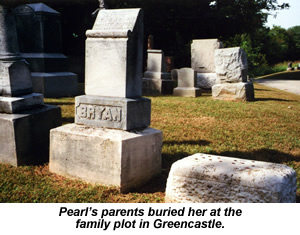 This phase of the paper's coverage hit its all-time low with a March 9 story headlined "Pegging Away", which appeared on page 2 of its main section. This is the lead paragraph in full:
This phase of the paper's coverage hit its all-time low with a March 9 story headlined "Pegging Away", which appeared on page 2 of its main section. This is the lead paragraph in full:
"There were no developments in the famous Pearl Bryan murder case in police circles yesterday. Detectives Crim and McDermott worked on some matters of minor importance in reference to the evidence in the case, but their work is of no interest to the public at this time. Chief Deitsch was not feeling well yesterday and did not leave his home in Cumminsville. The other officers of the police department did not gather anything pertaining to the Ft Thomas mystery." (37)
With stories like this filling their pages, the papers must have been mighty relieved when the day came round for Jackson and Walling's trip to Kentucky at last. Before he let them leave Ohio for good, though, Deitsch had just one more card to play.
Crowds of spectators and newspapermen gathered round Hamiliton County Jail every day during Jackson and Walling's final week there, but there never seemed to be anything to see. Even March 14, the Saturday Judge Buchwalter had specified for the two men's transfer, produced no sign of action.
All that changed on Tuesday morning, the 17th, when a police patrol wagon backed as close as it could get to the jail's entrance. The jail door flew open, and five men ran out. They dashed across the few yards of open space remaining, then leapt into the wagon and slammed its doors shut behind them. The stunned crowd had just enough time to recognise Sheriff Plummer, with Jackson and Walling handcuffed to two detectives behind him. Crim had charge of Walling, while McDermott was looking after Jackson. A cry went up: "They're going to Kentucky!"
The crowd erupted. Reporters rushed to the nearest telephone so they could order a cab. Anyone with a wagon nearby was bribed or bullied into co-operating too. By the time the patrol wagon could pick its way through the excited mob, there were already a dozen or more vehicles ready to follow it. Reaching the open street at last, the police driver whipped his reins to spur the team on.
"The horses were forced to run, and those following increased their speed accordingly," Barclay writes. "Fear was unmistakably seen on the countenances of both prisoners. Down Sycamore Street to Eighth the horses went on a wild run. Before reaching Eighth Street, Sheriff Plummer said it would be impossible to thwart the fast-increasing throng and, in order to throw them off their guard, ordered the driver to turn west off Sycamore on Eighth and drive to the Central Police Station.
"A large crowd awaited them there, and the prisoners were quickly hustled into the cells. The crowds increased until the large iron doors had to be closed to keep the crowds from the driveways and corridors of the big city building. The prisoners were kept there for two hours or more."
Barclay's account here matches what all the newspapers thought at the time - reflecting his cut-and-paste approach to producing the book - but the motive for the detour was actually very different. Deitsch had prepared a special cell for Jackson and Walling in Central Police Station's basement, and that's why they had to be delayed there.
"The cell was so arranged that it amplified any sound within it," Doran writes. "Through small holes in each end, wires led along the water pipes. These were arranged under the direction of Thomas Sullivan, who was then superintendant of the police telegraph service. In a room far removed from the cell, the wires were connected to earphones."
Sullivan cobbled this ingenious bugging system together from the station's existing telephone equipment. Telephone mouthpieces were pressed into service as remote microphones, and the earpieces cannibalised into primitive headphones. He called the result a "sensitive cell", and it's thought to be the first room like it America.
Jackson and Walling had been kept separate ever since their arrests, because police didn't want to give them any chance to cook up a story in private. At Central Police Station, though, they were thrown into the sensitive cell together, and left to their own devices. Crim and the other officers listened to what they said via Sullivan's equipment, while a secretary called Minnie Fey transcribed it all.
When Jackson's case eventually came to trial, the judge ruled Fey's full transcript inadmissable, which means reporters were never given a chance to see it. As far as I've been able to discover, no copy exists. Crim was allowed to summarise the results of the exercise in court, though, so at least we have that.
First, Crim said, he'd heard Jackson and Walling encouraging each other to keep their nerve and tell the police nothing. "Once Jackson asked Walling if he thought they would drive over the same way they had gone that other time," Crim testified. His understanding was that Jackson meant the coming trip to Newport, and was comparing it to their journey there on the night of Pearl's death. (38)
Jackson and Walling didn't know it but, by the time they'd finished their chat that afternoon, the nooses round both their necks had drawn a little tighter. There was no definitive smoking gun in their conversation - no outright admission of guilt or revelation about the head's disposal - but it did confirm their guilt in several smaller ways. Most importantly, there was nothing there that forced police to abandon anything in the case they already had against the two men, which Crim called "one of the most complete pictures ever built by circumstantial evidence".